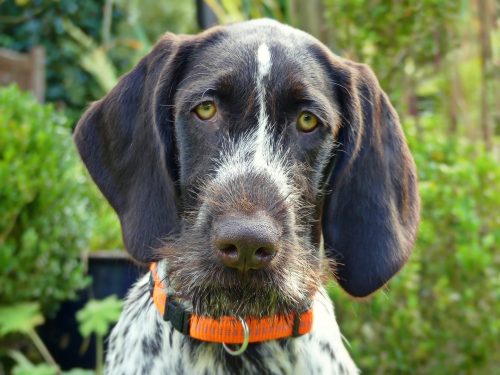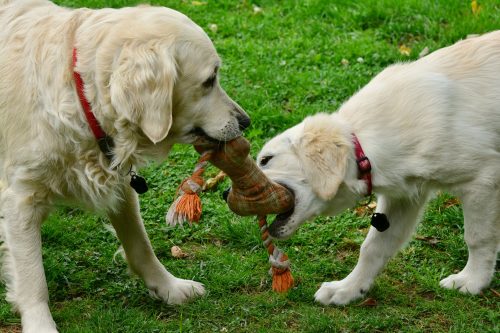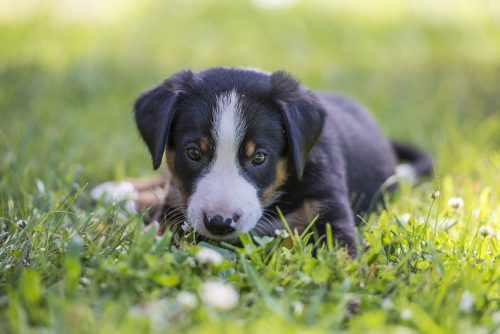Giardiasis in dogs is an infection of the small intestinal tract. It’s caused by an organism called giardia, a single-celled, protozoan parasite that is found in both the US, as well as worldwide.
Sometimes giardia is referred to as giardia duodenalis or giardia intestinalis. It is seen most often in younger dogs but is quite common to dogs in general. Dogs can contract giardia through the fecal contamination of food and water as well as through a contaminated crate, which can happen when they live in close quarters with other dogs.
Dogs can also contract giardia from ingesting soil that is contaminated with the organism, which often happens when you don’t keep your yard clean and pick up your dog’s poop each time they go.
What is Giardia in Dogs?

The giardia parasite replicates itself, feeds off the host, and then creates cysts to transmit to a new host. These cysts are passed via the feces, and when ingested by your dog, it causes contamination and infection. The cysts are the hardier form of giardia, and can survive outside of the host for quite some time in weather that is cool and wet. However, they will dehydrate quickly in hot and dry climates.
Currently, there is quite a bit that scientists do not know about the giardia parasite and its lifecycle, although they do know it is composed of two stages. The first stage is when the mature parasites that live in your dog’s small intestine attaches to the intestinal wall to feed. These mature forms of the giardia organism are called trophozoites.
The second stage of the giardia lifecycle is when these mature parasites duplicate themselves and proliferate. As they do, some of them transform back into cysts. These cysts wind up being expelled through the feces, and the feces is what contaminates water, soil, and grass, and gets passed on to other animals, to begin the cycle anew. Despite what we don’t know about it, the giardia infection is quite common in dogs.
Causes of Giardia in Dogs
A giardia infection is caused by the protozoal parasite itself. The parasitic organism can cause problems such as inhibiting proper enzymatic function, as well as disrupting the flora of the intestine. Giardia is contracted when your dog plays in and ingests soil that is contaminated, or if your dog drinks water that is contaminated. This might be water from a stream or pond, or even puddles. That’s why it is wise not to keep standing water in your yard for your dog to get into, as they could wind up sick from drinking it.
If your dog is around other animals, he can pick up the giardia organism that way too. Giardia can be transmitted from the feces of another animal, and if your dog comes into contact with it, he can accidentally ingest it by inhaling it.
Dogs can also accidentally transmit and ingest the parasite when they lick themselves and other animals, or pick it up when they eat grass, or eat poop, which is a common behavior in dogs.
Canines with poor immune systems tend to have a much harder time repelling giardia infections, and dogs that live in crowded environments (such as kennels and shelters) can pass the organism back and forth to each other in a vicious cycle if proper care isn’t taken when treating and disinfecting the whole place.
Unfortunately, puppies tend to be more at risk for giardia than adult dogs, due to their underdeveloped immune systems, which makes the giardia infection a bit more dangerous. Puppies can get dehydrated and malnourished quickly.
And unfortunately, since the cysts that are produced by the giardia organism can survive outside of its host for long periods of time in cool and damp environments, it makes it easy to pass around and transmit.

Signs & Symptoms of Giardia in Dogs
Sometimes dogs can be entirely asymptomatic, carrying the organism but never showing any signs they are ill. Thankfully, a giardia infection isn’t too serious, except in the case of pups and dogs with weak or compromised immune systems.
That said, the most common sign of giardia when one is present, is diarrhea in dogs. Especially diarrhea that has a sudden onset and is extremely foul-smelling. Sometimes your dog’s diarrhea may contain blood, or may have a somewhat green tinge in color.
The stool itself could be soft or watery, and may seem like it has a lot of mucus in it. Sometimes dogs will vomit when they have a giardia infection as well, although diarrhea is more likely. These symptoms can last several weeks, and you may also notice your dog appears to be losing weight. They may seem less active than normal, and may have a reduced appetite.
Other signs of a giardia infection in canines include:
- Gas
- Abdominal discomfort
- Dehydration
- Listlessness
- A poor looking coat
- Fatty-looking feces due to steatorrhea
- Diarrhea can also look frothy
Unfortunately, dogs that suffer from some other secondary infection or an immunosuppressive disease will experience stronger symptoms with giardia. The symptoms are frequently more noticeable in puppies, and can present as either chronic symptoms, intermittent symptoms, transient symptoms, or acute symptoms.
Prevention of Giardia in Dogs
Obviously preventing contamination will help to prevent the spread of a giardia infection. Unfortunately, the giardia protozoa can survive anywhere from several weeks up to months when given the proper environment. Typically, this means somewhere cold and wet. That makes kennels and shelters, as well as lawns and dog parks, ideal breeding grounds.
Keep your dog away from other animal feces as much as possible, and keep his environment as clean you can. Always make sure your dog has plenty of fresh water to drink so he doesn’t gravitate toward sources that could be contaminated. Dogs have a natural tendency to drink water wherever they may find it, even if it’s from a contaminated puddle. This puts your dog at risk for developing a giardia infection.
Sometimes, the giardia organism can even be found in tap water! If this is the case, you may have to buy a special filter to filter it out, or boil your water on a regular basis before allowing your dog to drink it. Frustrating, yes, but much better than cleaning up doggy accidents all over the house from upset bowels.
Diagnosing Giardia in Dogs

Diagnosing a giardia infection is possible, although it can at times be tricky. This is usually because the cysts may only pass through the feces with every other stool sample, so it can be difficult to catch. Plus, the protozoa are very small, unable to be seen with the naked eye, a microscope is required. Your vet will always perform a physical and take a full history in an attempt to rule out any other potential possibilities for your dog’s symptoms. Other causes of diarrhea in dogs could be malabsorption, maldigestion, and inflammatory bowel disease.
A serum biochemistry, a urinalysis, and a blood count are some of the other diagnostic tools your vet may choose to use when attempting to reach a determination. These tests will typically be used more to rule out other reasons for your dog’s illness, not necessarily to diagnose giardia.
Giardia is transmitted and found in the feces, so your vet will most likely do some type of fecal smear test to try to see if the organism is present. They might do a direct smear, which is a stool sample that is no older than 30 minutes, or a they might try a fecal flotation to test for cysts in the stool.
There is also a direct fluorescent antibody assay test, but this must be done at least three times in a week in order to be accurate. When multiple tests are required, they are sometimes called serial stool samples, and could be necessary to reach a definitive diagnosis. Another option that appears to be gaining in popularity with many vets is using ELISA technology to diagnose giardia. This test uses only a small fecal sample, and is quick as well as accurate. It’s becoming a top choice in vet offices.
Even so, if signs of giardia are found, it can still be difficult to diagnose. Sometimes negative tests do not mean there is no infection, and more confusingly, positive tests aren’t definitive either. Because giardia is so common, and can be found even if a dog doesn’t have diarrhea, it could be coincidence that the organism is found that all.
In some cases, the dog could just have a bacterial infection or something else that is causing his symptoms. So, all results need to be examined alongside your dog’s symptoms and medical history, and sometimes retesting may be necessary to reach a final determination.
Treating Giardia in Dogs
Once a diagnosis of giardia is reached, treatment options can be tricky too. A dog that has giardia but presents as asymptomatic, might still be treated just because your vet doesn’t want to risk possibly passing along a zoonotic infection to other people.
On the other hand, if you have a dog that seems to have all the signs of giardia, but testing does not find any evidence, should treatment be given? Typically, it will be, just to be on the safe side, especially since this type of organism is so easily transmitted and spread to both animals and humans.
If your vet decides treatment is in order, they may prescribe prescription medications, such as fenbendazole and metronidazole as well suggest regular bathing. Keeping your dog bathed will help to get rid of the parasite from the inside out, and make a repeat infection less likely.
Your vet will want to see your dog on a regular basis and do repeat diagnostic tests later down the road, just to make sure organism is gone. Otherwise your dog could end up suffering from a chronic infection, and his quality of life will be marred.

Chronic Giardia
In cases of chronic giardia, you may need to test other animals in your home, such as cats. Though there are different genotypes that affect cats and dogs, it is not beyond the realms of possibility for your cat to be infected and still have the ability to infect your dog too.
Unfortunately, with chronic giardia, cats may often be the culprit, and this is especially true if your dog tends to eat your cat’s feces, which is common doggy behavior. In fact, do your best not to allow your dog to eat any feces, cat or otherwise!
Can Humans Get Giardia?
Although it is possible for humans to be infected with giardia, and which is why treatment is given “just in case”, the reality is that the chances of a zoonotic infection are very low. This is especially true if you practice good hygiene, and wash your hands on a regular basis.
Most often, giardia is transmitted through drinking water when it comes to humans, and not transmitted from their pets. So, you will want to avoid drinking contaminated water sources, and that includes tap water that may be contaminated.
Again, if your tap water is known to hold the parasite, you may need to purchase a special water filter to make the water drinkable for both you and your four-legged family members. Also, sometimes giardia is found in the soil near food, which is yet another reason it is so important to wash all of your fruit and veggies before consumption, as well as keep your hands clean.




